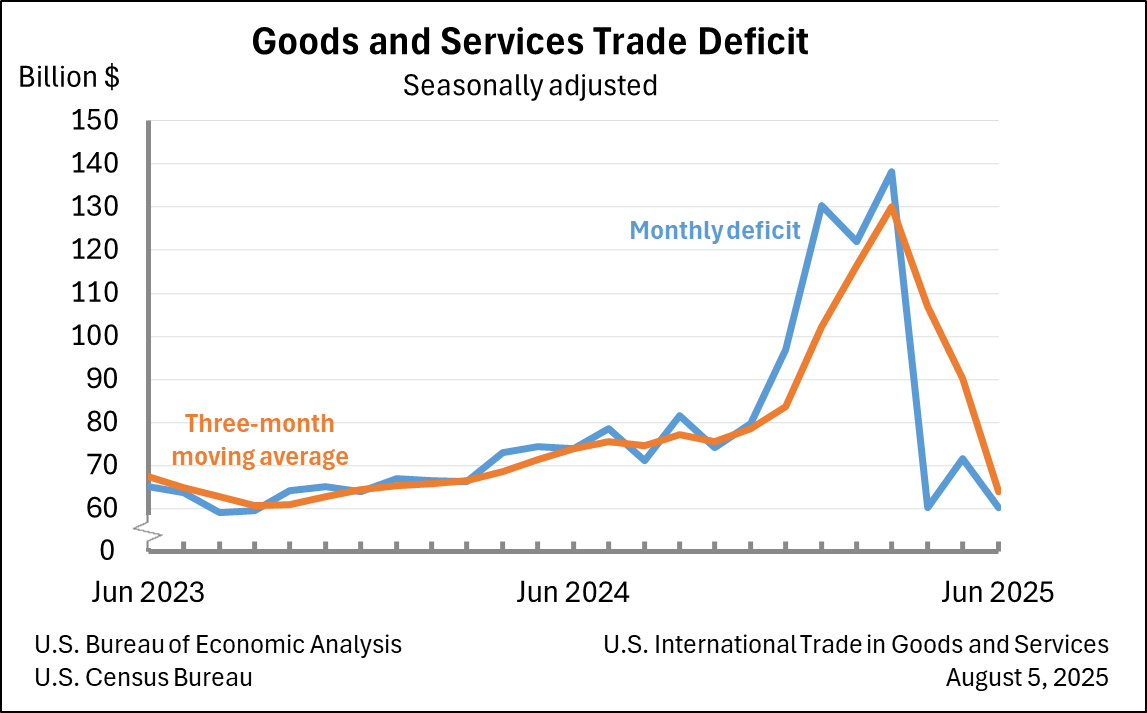Bureau of Economic Analysis
U.S. International Trade in Goods and Services, June 2025
The U.S. goods and services trade deficit decreased in June 2025 according to the U.S. Bureau of Economic Analysis and the U.S. Census Bureau. The deficit decreased from $71.7 billion in May (revised) to $60.2 billion in June, as exports decreased less than imports. The goods deficit decreased $11.4 billion in June to $85.9 billion. The services surplus increased $0.1 billion in June to $25.7 billion.
Principal Federal Economic Indicators
Noteworthy
- 2025 News Release Schedule
- Innovation at BEA
- 2025 Annual Updates
- New! Services Trade Data for More Countries
- Data Tool: Trade in Value Added
- Distribution of State Personal Income
- Updated: RIMS II Regional Multipliers
- Arts and Culture
- Space Economy
- FDI Now in State BEARFACTS
- Quick Guide: Price Indexes
The Latest
Gross Domestic Product by Industry, 2nd Quarter 2023 and Comprehensive Update
In the second quarter, the value added of private goods-producing industries increased 7.7 percent, private services-producing industries increased 1.0 percent, and government increased 1.0 percent. Overall, 13 of 22 industry groups contributed to the 2.1 percent increase in second-quarter real GDP.
Personal Income and Outlays, October 2023
Personal income increased $57.1 billion (0.2 percent at a monthly rate) in October. Disposable personal income —personal income less personal current taxes—increased $63.4 billion (0.3 percent). Personal outlays—the sum of personal consumption expenditures, personal interest payments, and personal current transfer payments—increased $43.8 billion (0.2 percent) and consumer spending increased $41.2 billion (0.2 percent). Personal saving was $…
Personal Income and Outlays, October 2023
Personal income increased $57.1 billion (0.2 percent at a monthly rate) in October. Disposable personal income (DPI)—personal income less personal current taxes—increased $63.4 billion (0.3 percent). Personal outlays—the sum of personal consumption expenditures (PCE), personal interest payments, and personal current transfer payments—increased $43.8 billion (0.2 percent) and consumer spending increased $41.2 billion (0.2 percent). Personal…
Gross Domestic Product (Second Estimate) Corporate Profits (Preliminary Estimate) Third Quarter 2023
Real gross domestic product (GDP) increased at an annual rate of 5.2 percent in the third quarter of 2023, according to the “second” estimate. In the second quarter, real GDP increased 2.1 percent. The increase in the third quarter primarily reflected increases in consumer spending and inventory investment. Imports, which are a subtraction in the calculation of GDP, increased.
Gross Domestic Product (Second Estimate) Corporate Profits (Preliminary Estimate) Third Quarter 2023
Real gross domestic product (GDP) increased at an annual rate of 5.2 percent in the third quarter of 2023, according to the “second” estimate. In the second quarter, real GDP increased 2.1 percent. The increase in the third quarter primarily reflected increases in consumer spending and inventory investment. Imports, which are a subtraction in the calculation of GDP, increased. Profits increased 3.3 percent at a quarterly rate in the third…
Outdoor Recreation Satellite Account, U.S. and States, 2022
The value added of the outdoor recreation economy accounted for 2.2 percent of current‐dollar gross domestic product for the nation in 2022. At the state level, value added for outdoor recreation as a share of state GDP ranged from 5.6 percent in Hawaii to 1.4 percent in Connecticut. The share was 0.9 percent in the District of Columbia.
Outdoor Recreation Satellite Account, U.S. and States, 2022
The value added of the outdoor recreation economy accounted for 2.2 percent ($563.7 billion) of current‐dollar gross domestic product (GDP) for the nation in 2022. At the state level, value added for outdoor recreation as a share of state GDP ranged from 5.6 percent in Hawaii to 1.4 percent in Connecticut. The share was 0.9 percent in the District of Columbia.
Activities of U.S. Multinational Enterprises, 2021
Worldwide employment by U.S. multinational enterprises (MNEs) increased 1.1 percent to 43.3 million workers in 2021 from 42.9 million workers in 2020.
Activities of U.S. Multinational Enterprises, 2021
Worldwide employment by U.S. multinational enterprises (MNEs) increased 1.1 percent to 43.3 million workers in 2021 (preliminary) from 42.9 million workers in 2020 (revised), according to statistics released today by the U.S. Bureau of Economic Analysis (BEA) on the operations and finances of U.S. parent companies and their foreign affiliates.
Personal Income by County and Metropolitan Area, 2022
In 2022, personal income, in current dollars, increased in 1,964 counties, decreased in 1,107, and was unchanged in 43. Personal income increased 2.1 percent in the metropolitan portion of the United States and 1.3 percent in the nonmetropolitan portion.




